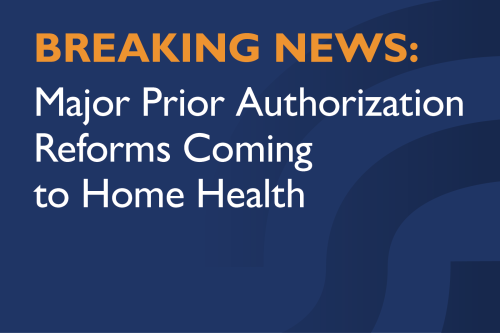Home Health News: Federal Officials Announce Sweeping Prior Authorization Reforms

June 26, 2025
In a groundbreaking development for the healthcare industry, federal officials announced this week that dozens of major health insurers and Medicare Advantage plans have committed to significantly reducing their use of prior authorizations. This news represents a significant victory for home health providers who have long struggled with these administrative barriers.
What’s Changing
According to a report by Kimberly Marselas for McKnight’s, Health and Human Services Secretary Robert F. Kennedy Jr. and Centers for Medicare & Medicaid Services Administrator Mehmet Oz met with congressional and industry leaders to announce reforms affecting nearly eight out of 10 Americans. Major insurers, including Centene, Cigna, CVS Health, Aetna, Blue Cross Blue Shield plans, Humana, and UnitedHealthcare, have signed on to these commitments.
The six key reforms include:
- Reducing the volume of medical services subject to prior authorization by January 1, 2026
- Honoring existing authorizations during insurance transitions
- Enhancing transparency around authorization decisions
- Standardizing electronic prior authorization submissions
- Expanding real-time responses with most approvals by 2027
- Ensuring medical professionals review all clinical denials
Impact on Home Health Providers
The timing couldn’t be better for home health agencies. McKnight’s reported that Medicare Advantage plans required prior authorizations about 125 times more often than regular Medicare in 2023, with MA plans expanding their use by nearly one-third from 2021 to 2023.
“Prior and ongoing authorization has been a challenge for Home Health providers, often resulting in denials, write-offs, and the need for additional staff. In eliminating prior authorization and automating future processes this is a win for Home Health’s especially with the increase in MA patients year over year. Agencies should still be mindful of staffing ratios and technology to gain even more efficiencies though as the payer landscape continues to change.”
Robert Simione, CPA, Senior Vice President at SimiTree.
The Road Ahead
While these voluntary commitments represent significant progress, the healthcare landscape continues to evolve rapidly. Home health agencies should prepare for:
- Reduced administrative burden as prior authorization requirements decrease
- Faster patient access to needed services with real-time approval processes
- Continued need for optimization in staffing and technology solutions
- Ongoing payer landscape changes requiring adaptable business strategies
What This Means for Your Agency
These reforms should translate into improved cash flow, reduced administrative costs, and better patient outcomes. However, agencies must remain proactive in optimizing their operations to capitalize on these changes fully.
At SimiTree, we’re monitoring these developments closely and helping our home health clients prepare for the evolving regulatory environment. Our expertise in healthcare operations and technology can help your agency maximize the benefits of these upcoming changes.
Want to learn how SimiTree can help your home health agency optimize operations? Contact us today for a consultation.
Source: This post references reporting by Kimberly Marselas for McKnight’s Long-Term Care News, published June 23, 2025. Original article details the federal announcement of insurer commitments to prior authorization reform.

